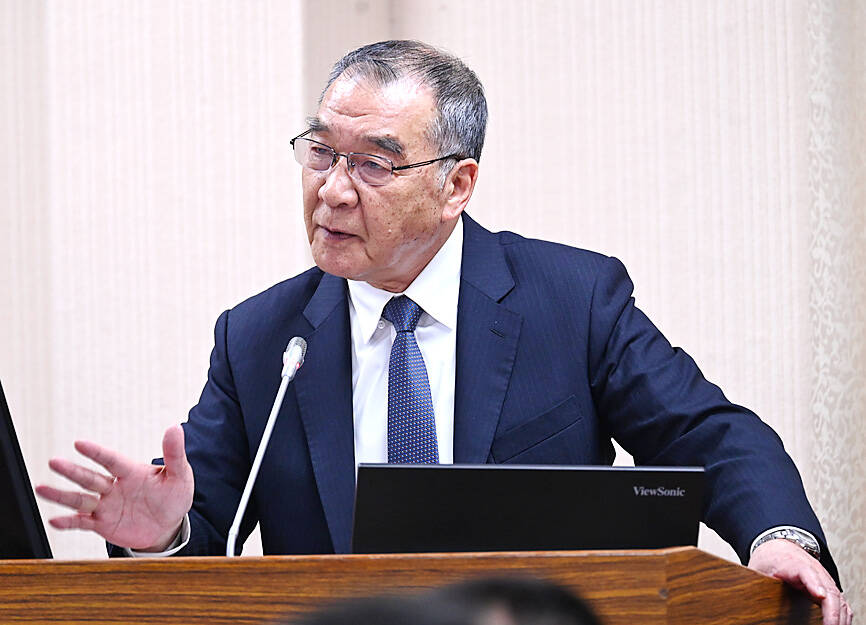Taiwanese armed forces, in accordance with longstanding practice, would take action against Chinese People’s Liberation Army (PLA) aircraft should they intrude on the nation’s sovereign airspace, Minister of National Defense Chiu Kuo-cheng (邱國正) said yesterday.
Chiu made the comments during an interpellation session at the legislature in response to questions by Democratic Progressive Party (DPP) Legislator Puma Shen (沈伯洋) and Chinese Nationalist Party (KMT) Legislator Lo Chih-chiang (羅智強) about the military’s definition of a Chinese attack.
Formerly, the armed forces were under orders to act only if Beijing’s forces “struck the first blow,” but this part of the military’s rule of engagement has long been revised, Chiu said.

Photo: Liu Hsin-de, Taipei Times
The nation’s military now operates under the principle that Chinese aircraft crossing into Taiwanese sovereign space constitutes an act of aggression and would be dealt with as if it launched a strike on Taiwan, he said.
The old guideline created during the tenure of the then-minister of national defense Tang Yao-ming (湯曜明) was changed to counter Beijing’s use of “gray zone” tactics, he said.
Asked by DPP Legislator Wang Ting-yu (王定宇) to confirm reports that US advisers are training one combined arms battalion each of the army’s 333rd Mechanized Infantry Brigade and 542nd Armored Brigade, Chiu said the information is “mostly correct.”
This training is part of the two nations’ collaboration on intelligence sharing and training, he said, adding that the two sides are considering upgrading the program to include more troops and higher-ranking officers.
Some conscripts performing the mandatory one-year military service would be called upon to receive training from US advisers, Chiu said.
The number of US personnel carrying out training in Taiwan has remained largely the same, but they are visiting the nation more frequently than before, he said, adding that US military personnel are not part of Taiwanese units.
Chiu said high turnover rates of US-trained military service members are a problem, but he understands soldiers returning from abroad could face difficulties adjusting to Taiwan’s military culture.
Separately, Chiu on the sidelines of the legislative session told reporters that Taiwan is not to engage in an arms race with China, as the resource gap between the two countries is too great for it to be viable.
Taiwanese armed forces’ disadvantage against the PLA in numbers and equipment cannot be made good by trying to match Beijing’s military spending, he said.
The nation’s forces would strengthen itself by other methods, including better training, he said.
Regarding the difficulties the nation experienced in obtaining arms from the US, Chiu said that problems with arms acquisition from a foreign source are expected.
The Ministry of National Defense has been using the 10-year force design plan system to deal with such issues and the scheduled delivery of certain defense articles in 2026 and 2027 would not have been possible without it, he said.
Chiu denied rumors that the nation’s defense officials attempted to strike deals for weapons in the Singapore Airshow last month.
Taiwanese officials did not discuss arms procurements with defense contractors present at the event to make up for the existing orders that have been delayed, he said.

Taipei, New Taipei City, Keelung and Taoyuan would issue a decision at 8pm on whether to cancel work and school tomorrow due to forecasted heavy rain, Keelung Mayor Hsieh Kuo-liang (謝國樑) said today. Hsieh told reporters that absent some pressing reason, the four northern cities would announce the decision jointly at 8pm. Keelung is expected to receive between 300mm and 490mm of rain in the period from 2pm today through 2pm tomorrow, Central Weather Administration data showed. Keelung City Government regulations stipulate that school and work can be canceled if rain totals in mountainous or low-elevation areas are forecast to exceed 350mm in

EVA Airways president Sun Chia-ming (孫嘉明) and other senior executives yesterday bowed in apology over the death of a flight attendant, saying the company has begun improving its health-reporting, review and work coordination mechanisms. “We promise to handle this matter with the utmost responsibility to ensure safer and healthier working conditions for all EVA Air employees,” Sun said. The flight attendant, a woman surnamed Sun (孫), died on Friday last week of undisclosed causes shortly after returning from a work assignment in Milan, Italy, the airline said. Chinese-language media reported that the woman fell ill working on a Taipei-to-Milan flight on Sept. 22

COUNTERMEASURE: Taiwan was to implement controls for 47 tech products bound for South Africa after the latter downgraded and renamed Taipei’s ‘de facto’ offices The Ministry of Foreign Affairs is still reviewing a new agreement proposed by the South African government last month to regulate the status of reciprocal representative offices, Minister of Foreign Affairs Lin Chia-lung (林佳龍) said yesterday. Asked about the latest developments in a year-long controversy over Taiwan’s de facto representative office in South Africa, Lin during a legislative session said that the ministry was consulting with legal experts on the proposed new agreement. While the new proposal offers Taiwan greater flexibility, the ministry does not find it acceptable, Lin said without elaborating. The ministry is still open to resuming retaliatory measures against South

1.4nm WAFERS: While TSMC is gearing up to expand its overseas production, it would also continue to invest in Taiwan, company chairman and CEO C.C. Wei said Taiwan Semiconductor Manufacturing Co (TSMC) has applied for permission to construct a new plant in the Central Taiwan Science Park (中部科學園區), which it would use for the production of new high-speed wafers, the National Science and Technology Council said yesterday. The council, which supervises three major science parks in Taiwan, confirmed that the Central Taiwan Science Park Bureau had received an application on Friday from TSMC, the world’s largest contract chipmaker, to commence work on the new A14 fab. A14 technology, a 1.4 nanometer (nm) process, is designed to drive artificial intelligence transformation by enabling faster computing and greater power